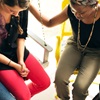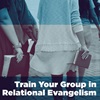There I sat, in a chair in the tattoo parlor, gazing at the assorted pictures and photos across the walls. Each one represented a mark on some person's body. Some were intricate and meaningful, others angry and violent, still others just silly. I (Kim) handed the artist a piece of paper with my choice for my tattoo: one word, diatribo.
"What's it say?" he asked, then tried to pronounce it.
"It's Greek," I said.
"What's it mean?" he asked.
"It literally means 'to rub between, to rub hard.' For me it means a shared life."
The artist smiled and began to prepare the apparatus. I am sure he had heard thousands of explanations for why people put particular words on their skin.
"Which way do you want it?" he asked. "Facing out, or is it for you to read?"
"This one's for me."
"Why this word?" he asked casually.
Why this word? It was used in the Bible to reflect shared life—abiding with one another, skin rubbing up against skin. Jesus shared his life with a small group of people. This incredible, kind, wise, loving teacher stuck with a bunch of young scalawags. And, along the way, who he was—his character, his nature—rubbed off on them.
I want to be like Jesus. I want to give my life to helping others. I want people to experience his grace and love and peace. I want Jesus to rub off of me and on to others, and I want Jesus to rub off of others and on to me.
Diatribo is one of my favorite words in the Bible. The English translations—"stayed with," "abided with,"—are insufficient to describe this sacred transaction between people. Diatribo is a way of life led by the Savior. I want to live with the same sacrificial purpose—that any good that God has redeemed in me and through me would graciously and generously rub off on others. It reminds me to give priority to relationships and to stay with the people God puts me with, even and maybe especially when staying is hard, when staying hurts.
I love people deeply. All people. A counselor once told me that I feel not only my pain, but also the pain of everyone in the room. I believe and see the best in people, and I make a habit of telling them how valuable they are.
I am not the smartest person in the Forge Mission Training Network. In fact, I am in awe of the authors and international consultants and world-famous preachers I get to work with. However, I have always known I was put on the earth to love others, not with some nominal, superficial, religious love, but with love like Christ's love, a giving of life for others.
Life-on-Life Learning
I was taught that way of loving as a young Christian. I have connected easily with Forge's idea of shared life and discipleship, and mission as a way of life not a program, because that is how I experienced it firsthand as a young person; the youth leader couple in my church invested in me and shared their lives. They were like the big brother and sister I never had. I will always cherish their mentoring of me.
My youth pastor, Steve Swain, took me under his wing and spent time both teaching me about life and showing me how to live. He and his wife, Sonia, opened their home, fed me, and let me sleep over when I needed to. Even their kids embraced me; I was best man in their oldest son's wedding.
Steve was no pushover; there were many tears and hard conversations between us. I could not lie to him because he knew all my thoughts. I'd sit in his office, sweating excessively, as he asked me questions I had no answers to. Steve is one of the most stubborn, straight-talking, confrontational people I have ever met.
Beyond opening his home to me and teaching me about Jesus, Steve took me all over Australia and even overseas to experience mission of the church firsthand. He taught me to talk to kids in the local high school about Jesus and to love those who were slowly finding their way back to God. He gave me my first opportunity to preach in a church—when I was 16.
I wanted to do what Steve did, so when I was 18, I became a pastor and got to work with him as his assistant youth pastor. When I was 20, Steve walked my wife down the aisle at our wedding (Maria's father had passed away several years before). When I was 24, we dreamed together and took the plunge into church planting as we started The Junction. We all knew it would be different because Steve is different, but we never knew how different it would be from your standard church plant.
The mentoring and discipleship that Steve gave me shaped my view of Jesus and how I should follow him. For the first part of our marriage, Maria and I poured ourselves into the lives of the young people at our local church, and then into the young adults and families of our new church plant. We opened our home and ate regularly with people. Whether it was refugees or newlyweds, we gave people time. We shared life with them. And this is how we live our life today.
More than a Friendly Church
When I came to the United States to lead Forge America and work with grassroots missionaries, megachurches, and multisite churches, I wanted to have the same posture. I don't want to belong to a friendly church that doesn't see life as something to be shared. I want the people of God to find and build friendships—lifelong ones. I value shared life.
This is one of the most intangible yet valuable postures of a missionary. It's discipleship in its simplest form. As Mike Breen, director of 3DM, says, the missional church will die without discipleship. Mike and his wife, Sally, lead their organization as if it were their family. That is the ethos of shared life we need in our churches and in our missional teams.
—Taken from Sentness by Kim Hammond and Darren Cronshaw. Copyright 2014 by Kim Hammond and Darren Cronshaw. Used by permission of InterVarsity Press, P.O. Box 1400, Downers Grove, IL 60515-1426.
Reflect
1. How much margin do I have in my life for this kind of shared life? What needs to go so I can create more margin?
2. As a leader, how much time and energy do I invest in relationships with group members where real life-on-life action takes place?
3. As a pastor, director, or coach, how can I share life with my leaders in this way?










